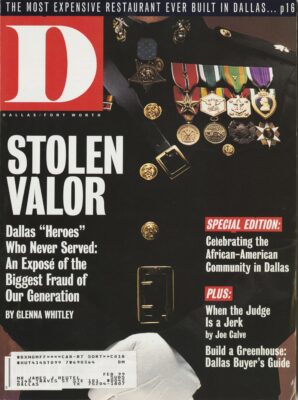WHENEVER BIG CITIES GET IN BIG TROUBLE. THEY look for a rescuer on a white horse. Actually, the color of the horse is not that important, but the color of the rider most definitely is.
The Lone Ranger and Tonto need not apply.
Cities in decline that also are predominantly “colored” usually decide it is time for a black mayor, one who can ease the fears of the powerful white establishment and bring hope to the largely dispossessed black minority. We’ve seen this occur in communities from Cleveland to Detroit, Philadelphia and Houston.
Dallas is no exception, and no one understands that better than Ron Kirk, who also clearly knows that as Dallas’ first African-American mayor, he has to work miracles in order to appear even moderately successful.
Dallas, while hardly a stranger to racial unrest, has escaped much of the deadly violence to have scarred many big Northern and Southern cities. Far more common has been periodic protest over police brutality, as well as disruptions of school board and City Council meetings.
In this context of racial confrontation, a declining downtown, and a deteriorating public image of Dallas nationwide, the city fathers decided Dallas now needed a black mayor.
Prior to Kirk’s candidacy, they seriously considered backing insurance man Tom Dunning-genial, liberal (by Dallas measurement), and well-respected around town.
Dunning had been a calm voice on former Mayor Annette Strauss’ “Dallas Together” tri-ethnic committee. He suggested solutions, rather than pointed out problems, and also proved that he could work with various socio-economic and ethnic groups. Tom Dunning had paid his dues. It was his turn to be mayor.
The city establishment, nevertheless, believed the new mayor should have a permanent tan.
They probably got the hint four years earlier when a coalition 3f community leaders tried to draft perhaps (he most respected clergyman in the city, the Rev. Zan Holmes, to run for mayor. Holmes seriously entertained the idea before declining.
In the 1995 mayoral campaign. Kirk quickly emerged as front-runner. The city’s white, mostly Republican, business leaders inted up the money to ensure Kirk would win the race, even though he was an unrepentant Democrat who had been Gov. Ann Richards’ secretary’ of state. But any suggestion that Kirk was for sale, that he would carry the water for the big guys, drew a scathing retort from the candidate. “I’m nobody’s water boy,” he would snarl.
No one who knew Ron Kirk and understood Dallas politics doubted that he’d protect the interests of big business. But anyone who thought he’d do so at the expense of black South Dallas was sorely mistaken.
Kirk won in 1995 without a runoff, garnering 62 percent of the vote, including 42 percent of the Anglo vote and 97 percent of the record-high black vote. He was as perfect as anyone could be for the job, although he knew all along that he would never be able to completely satisfy all of his constituencies.
He didn’t try.
First of all. Kirk directly addressed the race question. He publicly criticized his friend John Wiley Price for disrupting school board meetings, a position which won Kirk praise from his white supporters and brought Price with his “warriors” to protest at the mayor’s front step. Their relationship will never be the same.
Both men are pragmatists, however.
When Kirk staked his political career on selling his new sports arena plan to the voters, he would have lost save for help from Price. After receiving assurances that minority contractors would get a substantial amount of the arena construction business. Price at the 11th hour endorsed the mayor’s project and helped provide the necessary turnout from South Dallas to tip the election by the thinnest of margins.
Kirk went on to assemble the largest bond package in the city’s history, a major portion of which included his pet Trinity River project. Kirk knew that, regardless of the election’s outcome, he scored points simply for putting the issues on the table.
Kirk’s race is in some ways beside the point. He may be the first black man elected mayor of Dallas, but he should be remembered for his accomplishments as well as his color. He will easily win a second term if he wants it, and he does.
The interesting question now is what will Dallas do then? After new housing is built downtown and the new arena is constructed; after new economic development has come to South Dallas; after DART has expanded-what will Dallas do?
Probably elect a new white mayor.
Related Articles

Local News
Wherein We Ask: WTF Is Going on With DCAD’s Property Valuations?
Property tax valuations have increased by hundreds of thousands for some Dallas homeowners, providing quite a shock. What's up with that?

Commercial Real Estate
Former Mayor Tom Leppert: Let’s Get Back on Track, Dallas
The city has an opportunity to lead the charge in becoming a more connected and efficient America, writes the former public official and construction company CEO.
By Tom Leppert

Things to Do in Dallas
Things To Do in Dallas This Weekend
How to enjoy local arts, music, culture, food, fitness, and more all week long in Dallas.
By Bethany Erickson and Zoe Roberts


